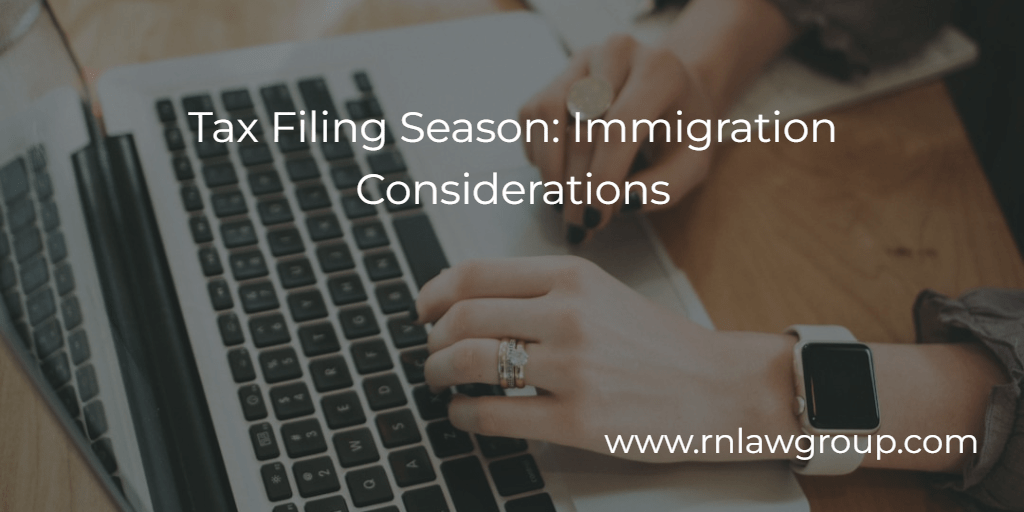
Tax Filing Season: Immigration Considerations
As we draw nearer to the deadline for tax filings in the United States, it becomes increasingly imperative for companies that sponsor foreign workers to grasp the critical role played by their annual tax returns in the context of immigration sponsorship petitions. It is essential for these companies to fully respect the significance of the financial data encapsulated within these returns and recognize how specific tax strategies, while advantageous for the business or shareholders, may inadvertently impede the immigration sponsorship process.
Frequently, a company’s tax returns and accompanying financial documentation serve as the linchpin determining whether they succeed or falter in attracting highly skilled foreign talent. Indeed, these documents often stand as the primary factor enabling or hindering a company’s ability to secure the services of such individuals. Hence, a comprehensive understanding of the implications of tax-related decisions on immigration sponsorship outcomes is paramount for companies seeking to maintain a competitive edge in talent acquisition within the global market.
Why are company tax returns important for immigration filings?
As a matter of background, the vast majority of employment-based immigrant visa petitions require a Labor Certification (PERM ETA 9089) identifies the proposed or “proffered” salary, i.e. the wage offered to the Alien pursuant to the green card job opportunity. For approval of an employment-based immigrant visa petitions, the sponsoring employer must demonstrate its continuing ability to pay the Alien’s proffered wage from the very start of the immigration process until the sponsored foreign-worker obtains Lawful Permanent Resident status, also known as Green Card status.
To demonstrate this ability to pay, as a form of initial evidence, United States Citizenship and Immigration Services (“USCIS”) requires submission of the company’s federal tax returns, audited financial statements, or annual report(s) along with payroll records demonstrating that, during the relevant time period in question, sponsoring employer has been paying the employee at least the proffered wage.
Generally, the tax form required from USCIS will be based upon the filing company’s business formation type (sole proprietorship, partnership, S-Corporation, LLC, etc.). For sole proprietors, USCIS will look to the company owner’s personal Form 1040, US Individual Income Tax Return, specifically Schedule C, Profit or Loss from Business. For partnerships, USCIS will look to the Form 1065, US Return of Partnership Income. For corporations or S-corporations, USCIS will look to the Form 1120 or 1120-S, respectively.
What financial numbers does USCIS look at?
When analyzing a tax return, USCIS is concerned with two independent numbers: net income and net assets. To demonstrate an ability to pay, generally a company must demonstrate it has net income or net assets in excess of the wage offered to the foreign worker. One important distinction to draw is that USCIS points to very specific places on the aforementioned tax forms to identify or calculate net income and/or net assets.
Regarding sole proprietorships, the company’s net income– if any– will be listed on Form 1040, US Individual Income Tax Return, specifically Schedule C, Profit or Loss from Business. As company is the same legal entity as the owner in a sole proprietorship, the assets of that individual are considered the company’s assets.
Regarding partnerships, corporations, and S-corporations, the company’s net income will be listed on the very first page of the tax return. For partnerships filing Form 1065 net income, look to Schedule A Line 22 under “Ordinary Business Income (loss). For corporations filing Form 1120, look to Schedule A Line 30 “Taxable Income”. For corporations filing Form 1120-S, look to Schedule A Line 21 under “Ordinary Business Income (loss)”.
For net assets, USCIS utilizes a specific formula. We look to Schedule L and aggregate the end of year cash, trade notes and accounts receivable less allowances for bad debts, inventories, US government obligations, tax-exempt securities, and other relevant current assets (All Forms Schedule A, lines 1-6) and subtract from that amount the aggregate accounts payable, mortgages, notes, and bonds payable in > 1 year, and other relevant current liabilities (Form 1065 Lines 15=17; Form 1120 and 1120-S Lines 16-18).
How much income or assets should the company show?
Typically, there is no one number that USCIS requires or wants to see before they approve immigration petitions. What is most important is that a company demonstrates its ability to pay the offered wages and this is typically based on the company’s net income or net assets. If the offered wage is lower than the company’s income or assets, USCIS will likely question the company’s ability to pay and subsequently deny the petition.
Therefore, as a general rule, it is always a best practice to demonstrate a net income and/or net assets exceeding the wages offered to your prospective foreign-worker employees. That said, it may be in the company’s overall best interest to forego certain tax avoidance strategies that lower the face value net income on a tax return so that this ability to pay requirement with USCIS is met.
Are the company’s tax returns too old? Can we submit Tax Extensions to USCIS?
Typically, USCIS will require the previous year’s tax return when analyzing a company’s ability to pay. Therefore, in 2024 USCIS looks to the company’s 2023 Tax Returns.
Currently as of April 2023, USCIS will continue to accept the company’s 2022 Tax Returns to show ability to pay in years 2022, 2023, and 2024. However, after the April 2024 tax filing deadline, USCIS will want to see either the company’s 2023 Tax Returns, or otherwise a timely filed Form 7004 Tax Filing Extension.
When submitting a tax extension along with the previous year’s tax return, USCIS will likely accept those documents as sufficient for ability to pay purposes until October of the given year. After that date, USCIS will expect the 2023 tax documents.
Do we have to submit the company’s tax returns?
Not necessarily. While it is most typical that a company will submit its tax returns, USCIS will also accept independently audited financial statements, or for certain publicly traded companies their annual reports.
Additionally, if a company employs more than 100 individuals, USCIS will accept an attestation from a financial officer of the company speaking to the company’s ability to pay the wages of all its sponsored employees.
For more information, or for a detailed conversation regarding tax filings and potential immigration issues, please schedule a time to speak here.
By Ryan A. Wilck, Partner and Attorney at Law
Ryan Wilck is a Managing Partner and attorney at Reddy Neumann Brown PC with over a decade of US immigration law experience, enthusiastic and proactive in his approach assisting clients and their employees through the various phases of the permanent residency a/k/a Green Card process. “Concilio et labore” is not only the motto of Ryan’s favorite sports club but is also his life’s motto; all things come through wisdom and effort. Ryan is passionate about gaining the trust of his clients by utilizing a relentless and detail-oriented approach to understand their specific goals and concerns, hoping to instill a sense of confidence and stability. Whatever your immigration problem or interest, he and his team will find a solution, through wisdom and effort. Reddy Neumann Brown PC has been serving the business community for over 20 years and is Houston’s largest immigration law firm focused solely on employment-based business immigration. We work with employers and their employees, helping navigate the complex immigration process efficiently and cost-effective.
We are committed to assisting our clients with navigating the complex PERM Labor Certification (ETA 9089 and other challenging immigration matters as an accomplished immigration law firm in Houston, Texas. Our team is here to offer the direction and support you require, whether you’re a company trying to hire top talent or a foreign worker seeking to develop a career in the United States. To find out more about how we can help you with your immigration issues, get in touch with us right away.

